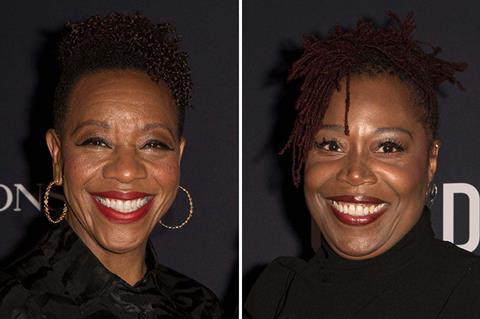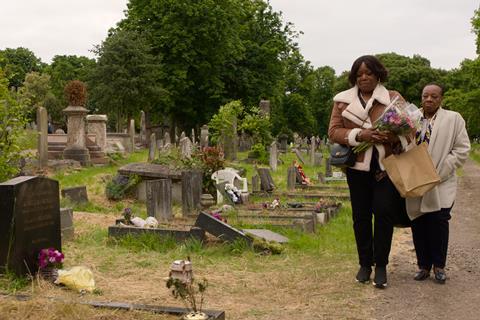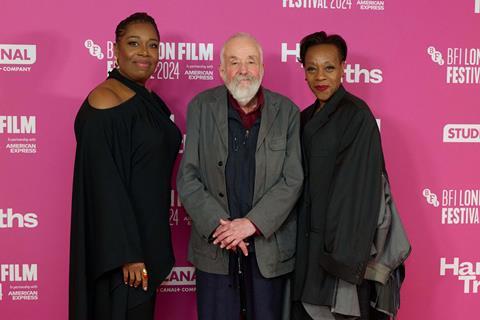Longtime Mike Leigh collaborators Michele Austin and Marianne Jean-Baptiste reunite in the director’s Hard Truths, playing two very different sisters living in north London.

After his recent period epics Mr. Turner and Peterloo, Mike Leigh returns to contemporary Britain with Hard Truths, the story of a fractured relationship between two sisters. The film would not have been possible without extraordinary collaborations with actresses Michele Austin and Marianne Jean-Baptiste.
Jean-Baptiste plays Pansy, a housewife living with her plumber husband and unemployed son. Pansy is agoraphobic, unhappy and moody, lashing out at everyone. Yet her hairstylist sister Chantelle is a single mother who has plenty of laughter and love with her daughters.
Jean-Baptiste and Austin have been longtime friends and collaborators since playing sisters in Leigh’s Theatre Royal Stratford East production of It’s A Great Big Shame! in 1993. They later worked together on other projects including Secrets & Lies, which earned Jean-Baptiste supporting actress Oscar and Bafta nods in 1997 and was Austin’s first film role. Austin also appeared in Leigh’s Another Year (2010) and All Or Nothing (2002).
Hard Truths shot in May and June 2023 in London, with Georgina Lowe producing for Thin Man Films. The drama premiered at Toronto and also screened in San Sebastian and New York Film Festival; Bleecker Street began the US rollout in early December while Studiocanal releases in the UK on January 31.
Both actresses were nominated at the British Independent Film Awards for Hard Truths; Jean-Baptiste also won the best actress award at the New York Critics Circle, as well as picking up a nomination for a Gotham award. The pair met Screen International in person during Los Angeles resident Jean-Baptiste’s visit to her birth city for the BFI London Film Festival, where Hard Truths had its UK premiere.
Screen: When you met back in 1993, did you have similar processes of working and have those processes evolved?
Marianne Jean-Baptiste: I had been out of drama school for three years, so I saw the process in which Mike works to develop characters and I’ve taken that way of working throughout my journey. Even though I’d gone to drama school and studied, this has always remained a way that I think about characters.
Michele Austin: I think I was lucky that when we did A Great Big Shame!, I’d just come out of drama school, I was so open to Mike’s process. Like Marianne, I think going forward, it has helped everything else. When I feel like I’m on shaky ground and I’ve got a lot to do, or maybe not hitting something that I need to hit, I revisit lots of things I’ve learned with Mike. This is a foundation of everything for me.
We’ve all heard about Mike’s process, but can you share more detail about what it looks like.
Jean-Baptiste: It’s a lot of talking at first. We are required to provide a list of people, real people, that we know. It could be the woman that runs the shop across the street that you see on a regular basis, or someone you saw on the Tube. We go through the list, and then it gets cut down so there’s one or two or three people on it. Then you merge those people, so those characteristics come together. Then you start from scratch, building a character from the first memory to the age they’re going to be in the film.
Austin: The bit of alchemy is the merging part, which is hard to describe. You’re taking bits from each person. Sometimes Mike can be very specific about what he wants you to take from a certain person. It might be their walk, or their voice, or another trait.
Jean-Baptiste: It becomes very imaginative. You start thinking, “What would she have been like when she was five?” Quite importantly, there is movement in this room — we’re not just sitting down, talking the whole time. You have to also physically get into this person.
Austin: We all have a physical life, a tempo, a rhythm, a sound. So it’s trying to find all of those things. Once you’re grounded in what you’re creating, you might be introduced to someone else and you start creating a collective, or in this case a family. As in life, you only know what you know about your character.
Does it ever get to be too much, when you think, “Someone just give me some lines to read!”?
Jean-Baptiste: Oh, my god, yes! I remember coming out of one session holding my head, feeling like I’d just been in hours of psychoanalysis [laughs].
You’re also doing other research outside of the rehearsal room?
Austin: Yes, everyone is. I would visit several different hair salons. I’d hang out with my own hairdressers. I remember going to see a woman in her fifties who is a colourist who has literally been doing hair since she left school, so learning from her was so important to Mike, and to me. It’s important that you’re not faking it. I loved the hairdressing, I could do braids and everything.
Marianne, I guess you couldn’t prepare for portraying Pansy by screaming at people in supermarkets?
Jean-Baptiste: No, I just observed and listened to voices and the intrusive thoughts and the way Pansy sees the world.
How did you want to portray the dynamic between these sisters?
Jean-Baptiste: Ultimately, the love is evident, but so is the disconnection. It’s also showing how one person can affect the people around them. When you’re working in this way, you feel very protective of the characters you play, and I think that is what makes them so multi-layered, because there’s still the vulnerability and kindness inbuilt, but some of them are dormant in that character.
Austin: We’re building a family with the other actors as well. There’s all the history we’ve baked into that: we all know they had Sunday dinners at the grandma’s house. They’ve got a shared history in how they all relate to each other.

What was the hardest scene?
Jean-Baptiste: I found the cemetery scene hard [with Pansy and Chantelle visiting their mother’s grave]. It’s not quite the turning point, but it starts to shift. There is a moment where their grief is completely shared, and the anger is gone.
Austin: As far as Chantelle is concerned, it’s the first time she’s felt like Pansy has softened. Also, at that stage Chantelle doesn’t know what’s coming. Pansy has never spoken like this. Chantelle is really worried. I suppose that’s why it was difficult, because you don’t know where the film’s going or where the characters are going.
Jean-Baptiste: You’d only know about what your character is doing. As far as everyone is concerned, they’re at the centre of the film, it’s just your story.
You don’t have the sides of the other actors?
Austin: There’s no such thing as sides. We improvise so much in rehearsals, again and again, and we fine-tune it. There is a script supervisor who is taking notes, and very slowly, Mike will build the scene from words from the improvisation. By the time we go to shoot, it’s very precise.
Jean-Baptiste: You never see this whole script. If you forget something, they will tell you. But that doesn’t happen much because you’ve created it.
Austin: But Mike can change things; he can make it travel in the way he wants it to go. Ultimately, he is directing, he does want your character to go in certain directions.
You’ve created this screen family — how hard is it to let go of a film like this because of the process?
Jean-Baptiste: I live in Los Angeles so I was just happy I got to be with my friend Michele for an extended amount of time. And it wasn’t enough.
Austin: It was very special because we had a proper reconnection. We love to laugh and eat food and go shopping together [laughs].
Jean-Baptiste: But I was relieved to get rid of Pansy. I don’t think I could have gone on for another few months.
Austin: What was particularly wonderful about this experience was the creation of this family. Especially for me because, when I worked with Mike before, I’ve come in to do a small character, and was more on my own. So it was nice to be able to just do the whole family thing again.

How did it help you working in these locations?
Jean-Baptiste: We rehearse in those locations; that’s part of the process — it starts to feel like home. Pansy knows where all her cleaning products are. We sit down with costume design and production design in the same way and describe what your character would have in their home, in their fridge, in the cupboards, what sort of towels or toilet paper they’d have.
Austin: For things you think are really important to your character, you flag up and they’re there. It’s exciting for production because it’s so specific so it can be very creative for them. Literally down to what type of knickers this woman would wear.
There are some people who would say this 81-year-old white man shouldn’t be telling the story of Black families, but clearly you two love working with him. What’s your take on that?
Jean-Baptiste: I don’t think that’s the issue. As we’ve spoken about already, it’s a unique experience for actors to collaborate fully with a director to create and bring to life characters from scratch — multi-layered — and I think every actor should be given the opportunity to work in that way.
Austin: I think Mike’s said this before: he’s made projects about Greek Australians, about a Jewish family in London, or a story set during The Troubles in Ireland. It’s just another story. And because of the way he works, it means, as Marianne said, these are multi-layered characters drawn from real life. Judging by the reaction to the film, I don’t really think it’s an issue. This is a film about a family — about life. This is a film about a woman in distress, which is a universal thing. Also, I think it’s really important that we see all different types of people going through life. Because that’s what we’re all doing, right?
How have audiences been reacting to Hard Truths?
Jean-Baptiste: A lot of people are identifying who Pansy is in their life: “That’s my mother-in-law!”, “That’s my sister!” And some other guy said, “I’m Pansy.” I said, “You’re too self-aware to be Pansy, Pansy doesn’t even know she’s Pansy.” It’s so satisfying that people are watching it and getting it.







![The Brightest SunScreen[Courtesy HKIFF]](https://d1nslcd7m2225b.cloudfront.net/Pictures/274x183/3/5/0/1448350_thebrightestsunscreencourtesyhkiff_312678.jpg)

















No comments yet